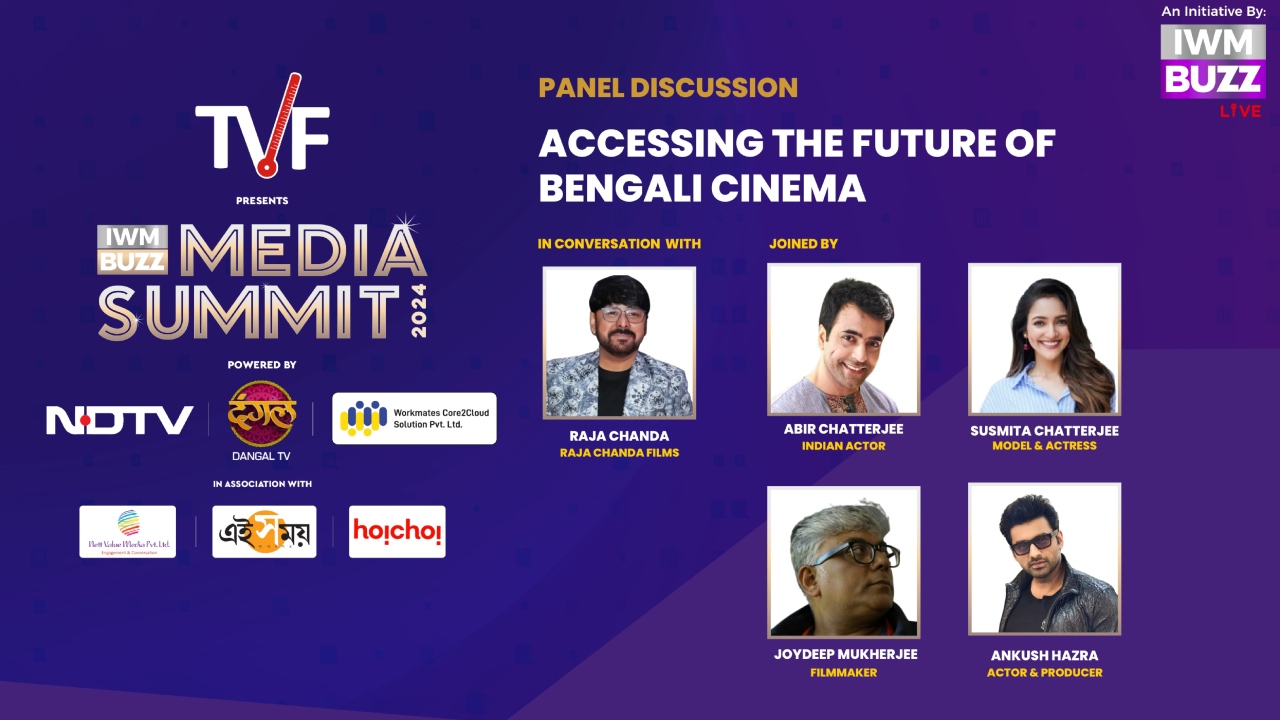The City of Joy became a bustling hub of creativity on November 14 as IWMBuzz hosted the much-anticipated Media Summit, drawing industry stalwarts and eager aspirants under one roof. Amidst the sprawling conversations spanning advertising, marketing, cinema, and more, one particular session held a magnetic allure: a lively panel discussion exploring “The Future of Bengali Cinema”.
Moderated by director Raja Chanda, the panel featured an enviable lineup—actors Abir Chatterjee, Ankush Hazra, and Susmita Chatterjee, alongside filmmakers Joydeep Mukherjee and Raja Chanda himself. The result? A thought-provoking, spirited, and occasionally fiery exchange of ideas.
Cracking The Gen-Z Code
Kicking things off, Raja Chanda steered the discussion towards connecting with younger audiences—Gen Z and Gen Alpha. Abir Chatterjee candidly shared his challenges in bridging the generational gap, particularly the stereotyping that tends to plague Bengali cinema. Yet, he credited his beloved “Sona Da” character for endearing him to young audiences, who he described as refreshingly “filterless” in their reactions.
“The challenge,” Abir mused, “lies in creating stories that resonate across age groups without diluting cultural identity.”
Bengali Cinema: Past Glory Or Present Struggles?
When Raja raised the ever-controversial topic of Bengali cinema’s supposed decline from its golden era, filmmaker Joydeep Mukherjee offered a measured response. “The glory isn’t gone,” he asserted, pointing to budgetary constraints as a significant limiting factor.
Ankush Hazra chimed in with a different perspective, lamenting the lack of loyalty among Bengali audiences. “In the South, there’s a culture of supporting regional cinema as a collective goal,” Ankush observed, adding that insufficient financial backing and undervalued writers are hindering progress. “Writers are the backbone of storytelling, yet they’re grossly underpaid,” he emphasized, drawing nods of agreement from Abir.
OTT: A Blessing Or A Challenge?
The conversation then veered into the realm of OTT platforms, a game-changer in the cinematic landscape. Joydeep highlighted the influence of social media reviews, while Raja questioned whether digital platforms could truly replace the magic of cinema halls.
Abir saw promise in OTT but also stressed that post-production and AI are rapidly transforming the industry. “Change isn’t inherently bad,” he noted, “but we need to strike a balance between tradition and innovation.”
Reels, Resonation, And The Future Of Content
No discussion on modern cinema would be complete without touching on reels and short-form content. Susmita Chatterjee brought her youthful perspective, acknowledging the massive content consumption on platforms like Instagram. But is brevity the future? Joydeep urged caution, warning against creating content solely for virality. “Cinema is a medium of storytelling, not just content generation,” he pointed out.
Major Challenges And The Way Forward
When Raja pressed for the biggest challenges facing Bengali cinema today, the panelists pulled no punches. Abir highlighted the growing generational divide and the importance of empathy in understanding audience preferences. Ankush tackled the stereotypes surrounding bangaliyana, emphasizing the need to move beyond caricatures of Bengali identity.
“Emotion is universal,” Ankush passionately declared. “If we create content that resonates deeply, it doesn’t matter if it’s overtly ‘Bengali’ or not.”
A Hopeful Horizon
The session ended on a hopeful note, with the panelists agreeing on the need for unity, investment in original stories, and embracing the winds of change without losing sight of Bengali cinema’s rich roots. While challenges abound, the spirited discussion proved that the future of Bengali cinema is far from bleak. Instead, it’s a canvas waiting for bold, collective strokes from creators, audiences, and industry leaders alike.
As the curtains closed on this insightful dialogue, one thing was clear: the Bengali film industry is ready to dream big—budget constraints, generational shifts, and all. Now, it’s up to us, the audience, to cheer it on. Let’s make it happen, Kolkata!
Title Partner: TVF
Powered by: NDTV | Dangal TV | Workmates Core2Cloud Solution Pvt. Ltd.
In Association with: Nett Value Media Pvt. Ltd. | Ei Samay | Hoichoi
Partners: Taarak Mehta Ka Ooltah Chashmah Rhymes | Redington Limited | White Frames | Just Lateral ThinkInk | Celebistaan | Decalogue
Watch the full video below:

